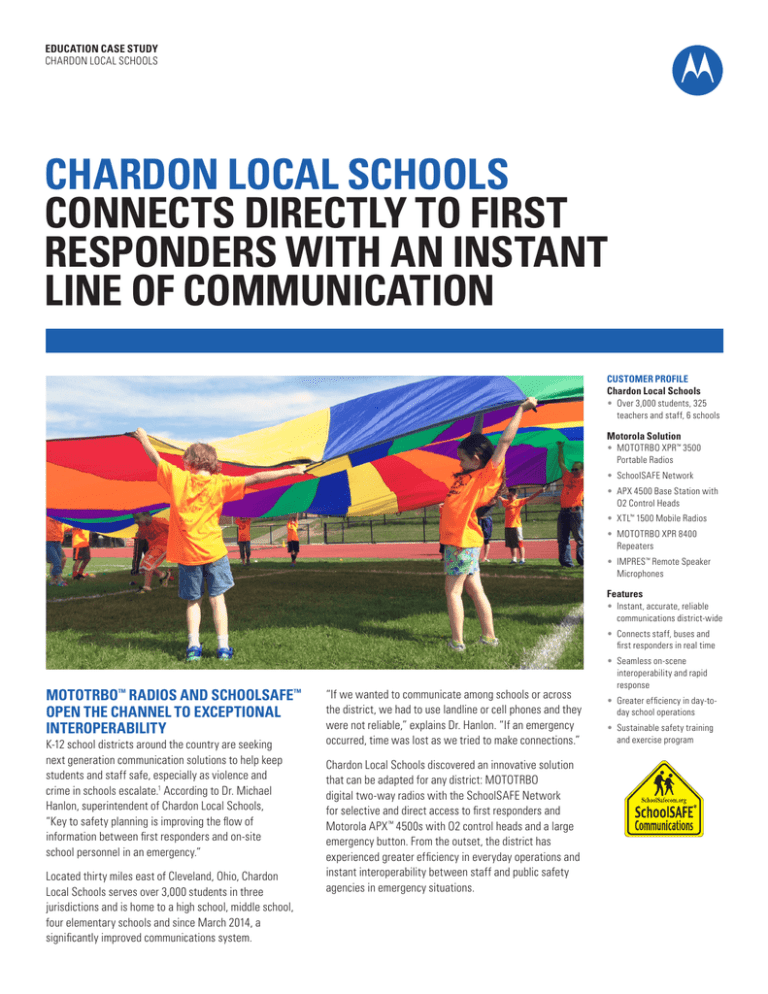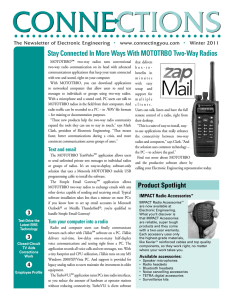
EDUCATION CASE STUDY
CHARDON LOCAL SCHOOLS
CHARDON LOCAL SCHOOLS
CONNECTS DIRECTLY TO FIRST
RESPONDERS WITH AN INSTANT
LINE OF COMMUNICATION
CUSTOMER PROFILE
Chardon Local Schools
• Over 3,000 students, 325
teachers and staff, 6 schools
Motorola Solution
• M
OTOTRBO XPR ™ 3500
Portable Radios
• S choolSAFE Network
• A
PX 4500 Base Station with
O2 Control Heads
• X TL™ 1500 Mobile Radios
• M
OTOTRBO XPR 8400
Repeaters
• I MPRES ™ Remote Speaker
Microphones
Features
• Instant, accurate, reliable
communications district-wide
• C onnects staff, buses and
first responders in real time
MOTOTRBO™ RADIOS AND SCHOOLSAFE™
OPEN THE CHANNEL TO EXCEPTIONAL
INTEROPERABILITY
K-12 school districts around the country are seeking
next generation communication solutions to help keep
students and staff safe, especially as violence and
crime in schools escalate.1 According to Dr. Michael
Hanlon, superintendent of Chardon Local Schools,
“Key to safety planning is improving the flow of
information between first responders and on-site
school personnel in an emergency.”
Located thirty miles east of Cleveland, Ohio, Chardon
Local Schools serves over 3,000 students in three
jurisdictions and is home to a high school, middle school,
four elementary schools and since March 2014, a
significantly improved communications system.
“If we wanted to communicate among schools or across
the district, we had to use landline or cell phones and they
were not reliable,” explains Dr. Hanlon. “If an emergency
occurred, time was lost as we tried to make connections.”
Chardon Local Schools discovered an innovative solution
that can be adapted for any district: MOTOTRBO
digital two-way radios with the SchoolSAFE Network
for selective and direct access to first responders and
Motorola APX ™ 4500s with O2 control heads and a large
emergency button. From the outset, the district has
experienced greater efficiency in everyday operations and
instant interoperability between staff and public safety
agencies in emergency situations.
• S eamless on-scene
interoperability and rapid
response
• G
reater efficiency in day-today school operations
• S ustainable safety training
and exercise program
EDUCATION CASE STUDY
CHARDON LOCAL SCHOOLS
THE CHALLENGE
THE SOLUTION
IMPROVE THE SPEED AND ACCURACY
OF EMERGENCY COMMUNICATIONS
MOTOTRBO AND SCHOOLSAFE
MAKE INTEROPERABILITY A REALITY
“We relied on walkie-talkie style radios that were
incompatible with each other from school to school.
There was no connectivity or bridging capability among
buildings,” says Dr. Michael Hanlon. The only way to
connect schools across the district was by phone and to
connect law enforcement, fire and EMS was by calling 9-1-1.
Working together with Motorola, SchoolSAFE, public
safety agencies and the local Motorola channel partner,
Chardon Local Schools implemented a groundbreaking
solution across the district. Approximately 250
MOTOTRBO XPR 3500 portable radios were distributed to
teachers, administrators and safety teams to help ensure
optimal coverage. Radios are licensed to each school with
a frequency specific to that school.
“In an emergency, we had to relay everything through the
voice of one caller to public safety,” he explains. “It was
inefficient at best and inaccurate at worst because of
incomplete information and first responders not knowing
what was going on. We knew cell phone networks
become overwhelmed in minutes. They simply can’t
handle the volume of calls.”
EXPECT CLEAR, RELIABLE COVERAGE
TO BE AN EVERYDAY CERTAINTY
Along with hardware is the SchoolSAFE Network
which enables interoperable communications between
each school’s MOTOTRBO radios and public safety’s
Motorola ASTRO® P25 radios. The district can bridge its
district-wide radio system to each school when the need
arises. 9-1-1 dispatchers control turning the bridge on
when a call comes in from a school.
According to Samantha Spaulding, Vice President of
Communications Service, the local Motorola channel
partner, not only was there a mix of radios from multiple
vendors, but several schools did not have licensed
frequencies. “Staff weren’t able to talk from building to
bus garage, literally right behind the school. They could
not be assured their different radios would work
together,” she says.
Some campuses were far apart, beyond the range of
a repeater, making inter-school radio communication
impossible. The lack of direct connectivity between the
schools and bus fleet was also problematic. Although
buses operated on the countywide P25 800 MHz MARCS
radio system, developed by Motorola, to link to public
safety, school personnel could not talk with drivers unless
they had a P25 800 MHz radio.
Once the SchoolSAFE public safety bridge is activated,
school personnel use their MOTOTRBO radios to talk
directly with 9-1-1 dispatchers and first responders
heading to the scene. Instead of information passing
through multiple parties or being incomplete, everyone
is on the same channel as an incident unfolds.
“We had a middle school student who had a seizure during
class, with no prior history,” recalls Dr. Hanlon. “Because
our teacher was trained on the new system, she talked
to EMTs before they even arrived, and the situation was
handled successfully.”
“Motorola radios with the SchoolSAFE Network improves our
security and our ability to respond quickly to situations. Now we can
communicate faster, effectively and directly to schools, buses and
public safety. We know it will keep students and staff safer.”
Dr. Michael Hanlon, Superintendent, Chardon Local Schools
EDUCATION CASE STUDY
CHARDON LOCAL SCHOOLS
PUBLIC SAFETY AND STUDENT SAFETY
ARE ON THE SAME WAVELENGTH
REAL-LIFE SCENARIOS PREPARE
EVERYONE TO RESPOND EFFECTIVELY
At the heart of the system is an incident control team
(ICT) at each school. The ICT typically consists of
non-classroom staff, such as a principal, assistant
principal, custodians and secretaries. The team acts as the
first line of response when an incident occurs on campus.
Training is integral to the success of the solution,
keeping it fresh for the district. First, principals and
staff learn radio “operability” so they become effective
communicators and can take control as incident
command. Next, through training with local public safety
agencies, they focus on “interoperability” so they interact
effectively with first responders when the bridge is on.
The second line is the MOTOTRBO radios deployed
throughout school buildings to create a perimeter. “If
there is an incident that requires handling beyond the
ICT,” explains Dr. Hanlon, “all a staff member has to do
is tell teachers monitoring a channel to switch to the
priority channel and we have instant communication
throughout the building.”
Ohio’s Multi Agency Radio Communications System
(MARCS) partnered with the State to provide a grant for
MARCS In-School Radios (MISR). One MISR is available
to every school building, public and private, in Ohio. This
allows for an immediate alert from the school district to
their Public Safety Answering Point (PSAP).
APX 02 CONTROL HEAD OPENS
ANOTHER CHANNEL FOR RESPONSE
“Each month our schools practice active drills so we
are prepared,” says Dr. Hanlon. “We play out actual
scenarios with officers to see how they respond and how
information is relayed, from an injured student on campus
to an accident on the bus. We get real-world experience
which is far more beneficial than a classroom exercise.”
Once schools meet certain benchmarks, they are
SchoolSAFE certified. “It’s another tangible benefit we
bring to the community,” explains Dr. Hanlon. “We can
say all our schools have this level of certification and
demonstrate our commitment to ensuring students and
staff remain safe.”
“When an incident
occurs, we know
what everyone is
doing and what is
expected.”
“Motorola
radios with the
SchoolSAFE
Network enable
everyone to be on
the same page.”
Chief
Scott Niehus,
Chardon Police
Department
A Motorola APX 4500 base station with O2 control head
outfitted with a large, orange emergency button and
paddle microphones delivers another layer of safety.
The control heads were provided by a grant from the
State of Ohio through a school security funding bill put
in place by the governor.
The control head is what Sheriff Dan McClelland
of Geauga County likens to “a fire alarm for law
enforcement.” His office and the school district decided
it will only be used in the event of an active shooter.
“When that button is pushed, the cavalry comes in,”
he says. “Even if school personnel can’t talk to us,
we can hear them.”
“Without radio communication, you can’t coordinate. Our ability
to get up-to-the second information and provide that to first
responders is critical. Now school staff can be anywhere and
have direct contact with a first responder and other staff.”
Dan McClelland, Geauga County Sheriff
EDUCATION CASE STUDY
CHARDON LOCAL SCHOOLS
THE BENEFITS
INSTANT, ACCURATE, TWO-WAY FLOW
OF INFORMATION
Today, staff in Chardon Local Schools, on buses and
in the field are linked to public safety in real time with
interoperability that never existed before. “The system
delivers a two-way flow of information that is critical
during an incident,” says Chief Scott Niehus of the
Chardon Police Department. “It gives us the ability to
communicate what is happening on our end. SchoolSAFE
gives the incident commander the ability to get accurate,
timely information back to teachers, staff and bus drivers,
who may be sequestered, as to what is occurring.”
“Whether it’s a heart attack happening or an intruder
moving across campus, getting information as the
situation unfolds is invaluable,” adds Sheriff McClelland.
The SchoolSAFE bridge is only turned on and off when
needed, leaving the radio frequencies available for
daily operations.
MORE EFFICIENT OPERATIONS AND MORE
EMPOWERED STAFF
Day-to-day communications have increased exponentially
with MOTOTRBO radios. “We actively use them in
the administration and operation of the building, from
inter-staff communications, alerting custodians to issues,
moving supplies, managing students and monitoring
recess times,” says Dr. Hanlon.
“We can communicate immediately with transportation
to make sure accurate information gets directly to the
bus drivers on how to handle a scenario. It is much more
efficient than an assistant principal standing outside
trying to talk to each driver individually,” he adds. “Our
staff also develops a level of familiarity with MOTOTRBO
radios so when a crisis arises, they are comfortable using
the technology effectively.”
FLEXIBLE SYSTEM ADAPTS TO SCHOOLS
TO HARDEN SAFETY
“The system is very flexible and can be customized to
schools,” says Samantha Spaulding, the local Motorola
channel partner. “It is up to the district and first
responders how they want to use the radios to improve
responsiveness and safety.”
“This system is all about interoperability,” emphasizes
Sheriff McClelland. “When we have an incident at a
school, the staff and administrators are part of our
emergency response. Being able to communicate
with them is critical. If you can’t communicate, you
can’t coordinate.”
“The safety and security of staff and students is
always our top priority,” says Dr. Hanlon. “We now have
consistent, reliable, accurate, effective information which
is a key ingredient in ensuring their safety every day.
This is the foundation upon which any school district
safety plan is built.”
To connect your schools directly to first responders, visit
motorolasolutions.com/education or contact your local Motorola representative.
1. Report: School Crime and Violence Rise, U.S. News and World Report, June 10, 2014
Motorola Solutions, Inc. 1301 E. Algonquin Road, Schaumburg, Illinois 60196 U.S.A. motorolasolutions.com
MOTOROLA, MOTO, MOTOROLA SOLUTIONS and the Stylized M Logo are trademarks or registered trademarks of Motorola Trademark Holdings, LLC
and are used under license. All other trademarks are the property of their respective owners. © 2015 Motorola Solutions, Inc. All rights reserved.
“Motorola
radios with the
SchoolSAFE
Network give us
an instant line of
communication we
can rely on. Even
in a large-scale
crisis, we can
maintain a flow of
information when
other forms of
communication
are going down.”
Dr. Michael Hanlon,
Superintendent,
Chardon Local
Schools






